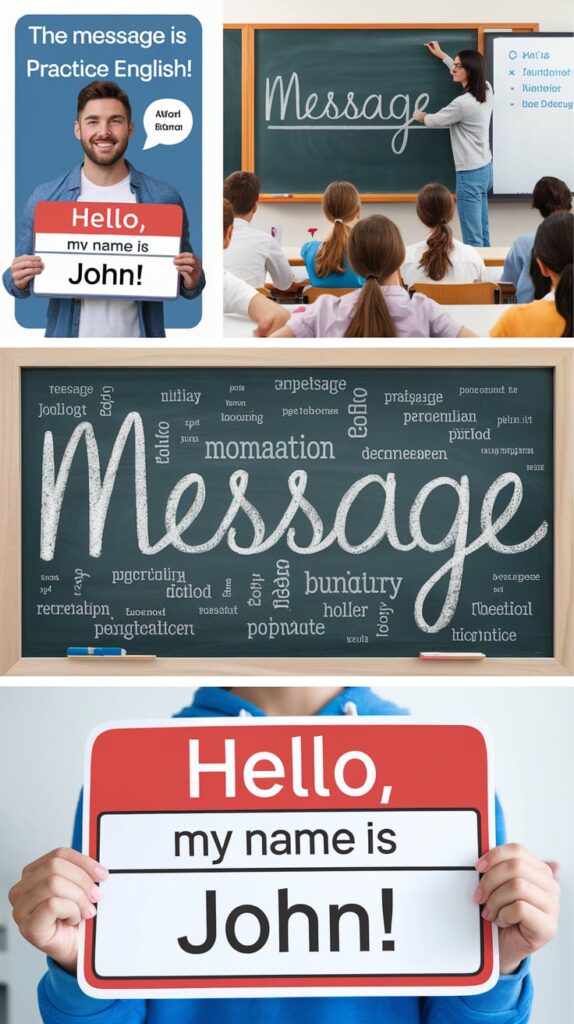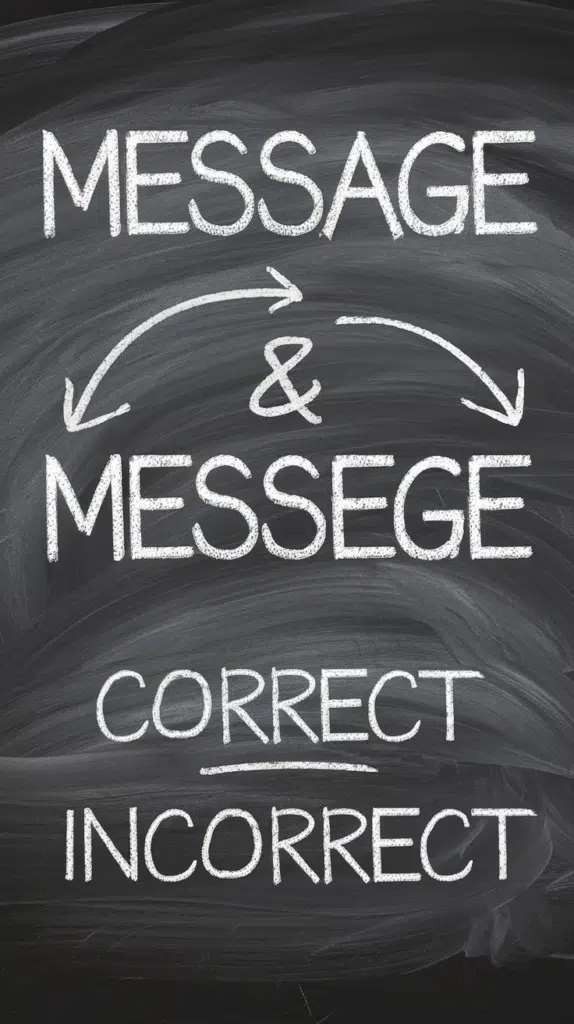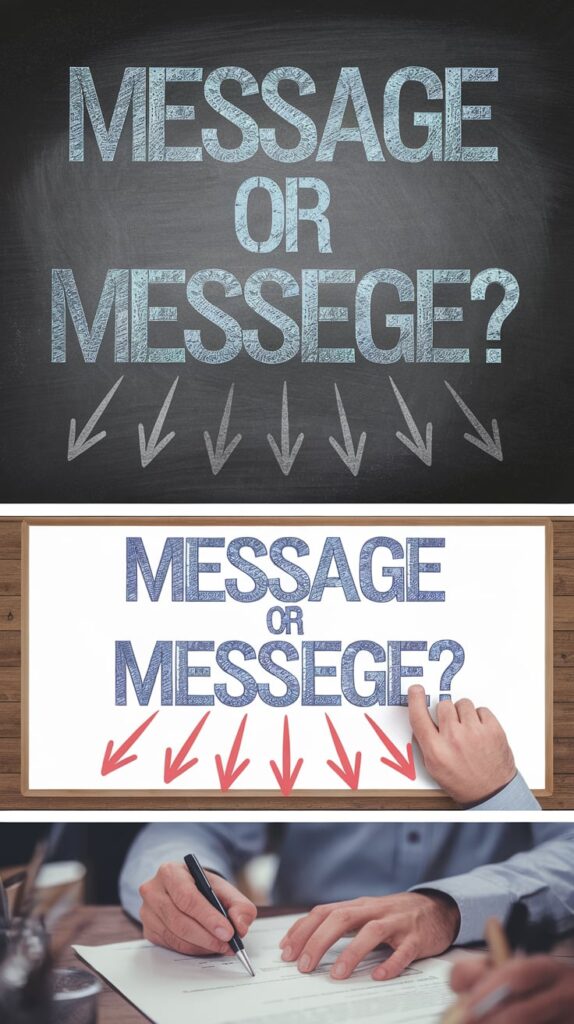intro
In our interconnected world, effective communication plays a crucial role in both personal and professional realms “messege” or “message.. However, some words often trip people up, leading to confusion and misunderstandings.
One such pair is “messege” or “message.” While these terms might sound similar, only one is correct. In this article, we will explore the differences between these two terms, their definitions, usage, and the importance of spelling in communication.
read more : Moment vs Momment – Grammar Beacon

Which One Has the Correct Spelling? Messege or Message?
When it comes to correct spelling, between messege or message the answer is straightforward: “message” is the proper term. The variant “messege” is simply a common misspelling. It’s essential to be aware of such errors, particularly in professional settings where clarity and accuracy are paramount. This article aims to clarify the proper use of “message” and highlight the significance of spelling in effective communication.In these two words message or messege, message is the correct word.
The Correct Spelling: Message
Definition of “Message”
The term “message” refers to a unit of communication that conveys thoughts, information, or emotions from one person to another. Messages can be communicated in various forms, such as spoken words, written text, or visual representations. Understanding what constitutes a “message” is vital for effective communication.
read more : GNG Meaning In Text and TikTok – Grammar Beacon
Usage of “Message”
Written Communication: In today’s digital age, written messages are ubiquitous. This includes everything from text messages sent via smartphones to formal emails and letters.
For example, when you send a message to a colleague about a meeting, you’re conveying crucial information clearly.
Spoken Communication: Messages can also be communicated verbally. For instance, when you tell a friend, “I received your message, and I will reply soon,” you’re engaging in direct communication that emphasizes understanding.
Visual Communication: Sometimes, messages are conveyed through images, symbols, or diagrams. An advertisement, for instance, aims to send a message about a product’s benefits using visual elements.
Examples of “Message” in Sentences
To illustrate the usage of “message,” consider these examples:
- Casual Context: “I just sent you a message on social media; check it out!”
- Professional Context: “The manager’s message regarding the new policy was clear and concise.”
- Emotional Context: “Her heartfelt message in the card brought tears to my eyes.”
These examples demonstrate how versatile the term “message” can be across various contexts.
Common Mistakes: “Messege”
Despite its straightforward definition, many individuals still mistakenly spell “message” or “messege.” This common error often arises from typographical mistakes or reliance on autocorrect features.
Reasons for Confusion
- Phonetic Similarity: The two words sound alike, which can lead to confusion when writing quickly.
- Typing Errors: Fast typists may accidentally misspell words, especially if they are distracted or in a rush.
- Autocorrect Issues: Sometimes, autocorrect settings don’t catch misspellings like “messege.”
Importance of Correct Spelling
Using the correct spelling of “message” is vital for several reasons:
Clarity: Correct spelling ensures that your audience understands your communication without ambiguity. A misspelled word can lead to confusion and misinterpretation.
read more : Nouns That Start With A – Grammar Beacon
Professionalism: Accurate spelling reflects your attention to detail, which is crucial in professional settings. A well-crafted message enhances your image as a competent communicator.
Credibility: Consistent use of correct spelling helps maintain your reliability as a communicator. When your audience sees you making careless errors, it can undermine their trust in your information.
Accurate Information: Miscommunication can arise from misspellings, leading to potential misunderstandings. For example, if you send a message with a typo, the recipient may misinterpret your intent.
Searchability: In digital communications, accurate spelling can enhance your visibility online. Misspellings can result in lost opportunities, whether in personal connections or professional engagements.
Brand Image: For businesses, maintaining proper spelling is crucial for projecting a positive brand image. A small error can have significant consequences for a company’s reputation.
Legal Clarity: In legal contexts, precise spelling can avoid disputes over miscommunication. Misunderstandings in contracts or agreements can lead to costly legal battles.

The Importance of Effective Communication
Understanding the nuances of words like “message” is vital for ensuring effective communication. Whether you’re sending a quick text or drafting a formal email, clarity is key. Here’s why effective communication matters:
Building Relationships
Clear communication helps build and maintain relationships, whether personal or professional. When you send a clear message, it fosters understanding and trust between parties.
For instance, in friendships, open communication helps resolve conflicts and strengthen bonds.
Enhancing Professionalism
In the workplace, professionalism hinges on effective communication. A well-crafted message can influence your career trajectory, help you network, and establish your reputation.
When communicating with colleagues or clients, clarity can prevent misunderstandings and enhance collaboration.
Avoiding Misunderstandings
Miscommunication can lead to confusion and conflict. By using correct spelling and clear language, you minimize the risk of misunderstandings, ensuring everyone is on the same page.
For example, sending an unclear email can lead to incorrect assumptions, resulting in wasted time and effort.
read more : Afterward or Afterwards – Grammar Beacon

Common Contexts for Using “Message”
The term “message” appears in various contexts. Let’s explore some common scenarios where you might use it:
Personal Messages
In personal communications, a message can convey feelings, share updates, or coordinate plans. For example, “I sent you a message about our dinner plans this weekend.” This type of communication helps individuals stay connected and informed.
Professional Messages
In a work environment, messages are often more structured. You might say, “Please check your email for the message regarding the upcoming meeting.” Professional messages are essential for maintaining organization and clarity within teams.
Marketing and Advertising
In marketing, the message is crucial. Companies strive to deliver clear and compelling messages that resonate with their target audience. For instance, “Our campaign’s message focuses on sustainability and community.”
Crafting a clear marketing message can significantly impact customer engagement and brand perception.
Educational Settings
In educational contexts, clarity in messages can significantly impact learning outcomes. A teacher might say, “I’ve sent a message to all students regarding the homework assignment.” Clear communication in education ensures that students understand their responsibilities and expectations.
Enhancing Your Communication Skills
Improving your communication skills involves more than just understanding spelling. Here are some tips to enhance your effectiveness:
Practice Active Listening
Effective communication is a two-way street. Practice active listening to ensure you understand the messages being conveyed by others. This skill helps foster mutual understanding and respect in conversations.
Be Concise
When crafting a message, aim for clarity and brevity. Long-winded explanations can dilute your main point. For example, instead of saying, “I would like to discuss the project we are currently working on,” simply say, “Let’s discuss our current project.”
Use Visual Aids
In presentations or written communications, consider using visuals to reinforce your message. Diagrams, charts, and images can help clarify complex information and make your message more engaging.
Proofread Your Messages
Always take the time to proofread your communications. This helps catch errors like “messege” and ensures your message is polished and professional. Using tools like grammar checkers can also be beneficial.
The Role of Digital Communication
In an increasingly digital world, the way we send and receive messages has evolved. Let’s explore how digital communication impacts our understanding of the term.
Text Messaging
With the rise of smartphones, text messaging has become a dominant form of communication. Quick messages allow for immediate interaction, but it’s essential to maintain clarity even in short formats.
For example, instead of using abbreviations that might confuse the recipient, opt for clearer language.
Social Media
Platforms like Facebook, Twitter, and Instagram enable users to send messages to a broader audience. The challenge lies in crafting messages that resonate with diverse audiences.
Understanding your audience can help tailor your message for maximum impact.
Email Communication
Emails remain a staple in professional communication. Crafting a clear and concise message in an email is crucial for conveying your intent and maintaining professionalism.
Consider using bullet points or headings to organize your message effectively.
Instant Messaging Platforms
Tools like Slack and Microsoft Teams have transformed workplace communication. Here, sending a clear message can enhance team collaboration and efficiency.
Utilizing channels and threads effectively can help keep conversations organized.
Cultural Implications of Messages
The way we send and interpret messages can vary across cultures. Understanding these differences is vital for effective international communication.

Verbal and Non-Verbal Cues
Different cultures may emphasize various aspects of communication. For instance, in some cultures, non-verbal cues are just as important as spoken messages.
Being aware of cultural differences in communication styles can enhance your effectiveness in diverse settings.
Context Matters
Cultural context can influence how a message is received. What may be considered a straightforward message in one culture might be perceived differently in another.
For example, direct communication is valued in some cultures, while others may prefer a more indirect approach.
Strategies for Crafting Effective Messages
To enhance your communication skills, consider these strategies for crafting effective messages:
###
Know Your Audience
Understanding your audience is crucial for tailoring your message. Consider their preferences, knowledge level, and cultural background when crafting your communication. This approach ensures that your message resonates with the recipient.
Choose the Right Medium
Select the appropriate medium for your message. Some communications are best delivered via email, while others may be more suitable for face-to-face conversations or social media. Matching the medium to the message enhances clarity.
Structure Your Message
A well-structured message improves readability and comprehension. Consider using headings, bullet points, or numbered lists to organize your thoughts effectively. This approach helps guide the recipient through your message.
Be Clear and Direct
Avoid ambiguity in your message. Be straightforward and clear about your intent. Instead of saying, “We might want to consider changing our plans,” say, “Let’s change our plans to meet at 3 PM instead.”
The Evolution of Messaging
Over the years, the methods we use to send and receive messages have evolved dramatically. Let’s explore this evolution:
Traditional Methods
Historically, messages were conveyed through letters, face-to-face conversations, and printed materials. These methods were often time-consuming but allowed for detailed and thoughtful communication.
The Digital Revolution
With the advent of the internet and mobile technology, communication became faster and more accessible. Email, instant messaging, and social media transformed the landscape, enabling instantaneous communication across the globe.
The Rise of Social Media
Social media platforms have revolutionized how we share and receive messages. These platforms allow for real-time communication and the ability to engage with a wide audience, altering the dynamics of personal and professional interactions.
The Future of Messaging
As technology continues to advance, the way we communicate will likely evolve further. Here are some trends to watch:
Increased Use of AI
Artificial intelligence is becoming more prevalent in communication. Tools like chatbots and virtual assistants are now capable of sending messages and responding to inquiries, streamlining communication processes.
Greater Emphasis on Visual Communication
Visual communication is on the rise, with graphics and videos often being more effective than text alone. Future messages may rely heavily on visual elements to convey complex information quickly.
Emphasis on Privacy and Security
As concerns about privacy grow, individuals and organizations may prioritize secure messaging platforms. Ensuring that messages are protected from unauthorized access will become increasingly important.
Conclusion
In summary, understanding the difference between messege or message is essential for effective communication. Using the correct spelling enhances clarity, professionalism, and credibility.
As you navigate both personal and professional interactions, remember that every message you send has the potential to impact relationships and convey your intentions.
By prioritizing clear and accurate communication, you can foster better connections and ensure your thoughts are understood. So, the next time you send a message, take a moment to ensure it reflects your best self—clear, concise, and correct.
In doing so, you contribute to a world where communication thrives, misunderstandings diminish, and connections deepen.

James Logan is a seasoned blogger and language enthusiast behind Grammar Beacon. With years of experience in grammar and writing, James shares his expertise through insightful and engaging content. His passion for clear communication and linguistic precision shines in every post, making complex grammar concepts accessible and enjoyable for readers. Follow James for expert advice and tips to refine your writing skills.







